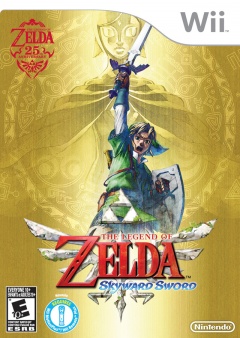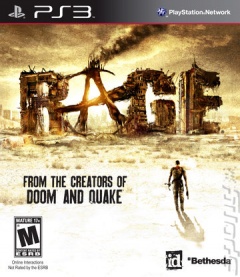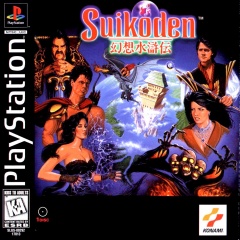mute hero
The Legend of Zelda: Skyward Sword
 The lasting impression from my recent introduction to the original
Legend of Zelda was its unstructured progression. With only a ghost of a
narrative driving the action and few barriers to limit wanderlust, the
course of my trip through Hyrule was almost entirely up to me. Having played Ocarina of
Time before any other Zelda game, I was surprised to see just how
hands-off the original was.
The lasting impression from my recent introduction to the original
Legend of Zelda was its unstructured progression. With only a ghost of a
narrative driving the action and few barriers to limit wanderlust, the
course of my trip through Hyrule was almost entirely up to me. Having played Ocarina of
Time before any other Zelda game, I was surprised to see just how
hands-off the original was.
In contrast, last month's Skyward Sword may be the most linear Zelda experience yet. The newest quest sees Link flying from one compact landmass to the next with hardly any room for side trips. The vast sky of islands is sparser than Wind Waker's nearly endless ocean, and even the surface world below is but three masses of land separated by impenetrable mountain ranges and deserts and forests. This is a Zelda where the path to the next waypoint is often the only path.
Every game in the series since the eighties original has trended towards structure and direction as story progression and ability acquisition gained a greater share of the Zelda spirit. Aesthetic similarities and recurring tropes aside, The Legend of Zelda and Skyward Sword could be mistaken for two wholly separate franchises. For better or worse, Skyward Sword feels like the end state of a slow evolution that Nintendo has been cooking for twenty-five years.
The Legend of Zelda: Skyward Sword [Video]
 With so many Legend of Zelda re-releases in 2011, I've had several
excuses to reacquaint myself with the series for the last six months. I
awakened Link for the first time, replayed bits of the first Zelda game I
ever experienced, tried out a solo retrofit of the franchise's
multiplayer experiment, and even charted my way through the legend that
begot legends. For me, 2011 has been the year of Zelda.
With so many Legend of Zelda re-releases in 2011, I've had several
excuses to reacquaint myself with the series for the last six months. I
awakened Link for the first time, replayed bits of the first Zelda game I
ever experienced, tried out a solo retrofit of the franchise's
multiplayer experiment, and even charted my way through the legend that
begot legends. For me, 2011 has been the year of Zelda.
Through this trip back through time, I've reevaluated my regard for Nintendo's beloved adventure franchise, and just in time for the newest iteration. Skyward Sword, at a glance, looks like just another Zelda, which is enough for most fans but insufficient for me. On top of that, the game boasts a distinct watercolor style, a sky/land dichotomy, and what appears to be an origin story for many of the franchise's trademark elements.
What has me excited is the motion-controlled combat. I loved the MotionPlus combat in Red Steel 2, and Skyward Sword uses the gyroscope add-on to provide needed nuance to Zelda's normally dull swordplay. Comparisons to Punch Out's puzzle-like duels have me salivating all the more.
Unfortunately, I didn't get to experience much of that in Skyward Sword's opening sixty. That's disheartening enough, but Skyward Sword doesn't stop at mere disappointment...the game outright insults me. Take a look:
Rage [Video]
 I've never played a game developed by id Software. Not Doom, not Quake, not Wolfenstein, not nothing. I didn't play PC games much back when id was more prolific, and I had a prejudice against overly gory shooters. To
me, they prioritized shock value over sound game
mechanics, kind of like Mortal Kombat. Considering their lasting appeal,
that was probably not my most sound judgment.
I've never played a game developed by id Software. Not Doom, not Quake, not Wolfenstein, not nothing. I didn't play PC games much back when id was more prolific, and I had a prejudice against overly gory shooters. To
me, they prioritized shock value over sound game
mechanics, kind of like Mortal Kombat. Considering their lasting appeal,
that was probably not my most sound judgment.
In my defense, id Software hasn't given me much to work with lately. The developer has only just this week released Rage, its first major game since 2004's Doom 3. Rage had been building up a lot of good press since its announcement back in 2007, earning plenty of "most anticipated" awards from major media outlets (yes, there are awards for such things). All the praise was a bit perplexing to me, though: by all appearances, Rage seems like yet another competent first person shooter with some car combat on the side.
But hey, now I can say I've played an id Software game (or at least an hour of it). Check out an early mission video below to see a short sample of Rage's early goings.
Suikoden
 I tend to be conscious of the games I buy. When I plunk the cash onto
the counter, I've usually made the decision to do so months in advance.
I've read some previews, watched plenty of gameplay clips, and probably
played a demo (if available). This is normal for people to do
when they're about to shell out $60 and tax, but I tend to do my
research even when the game can be bought for a Hamilton. What can I
say? I'm kind of stingy. Chicks love a pennypincher.
I tend to be conscious of the games I buy. When I plunk the cash onto
the counter, I've usually made the decision to do so months in advance.
I've read some previews, watched plenty of gameplay clips, and probably
played a demo (if available). This is normal for people to do
when they're about to shell out $60 and tax, but I tend to do my
research even when the game can be bought for a Hamilton. What can I
say? I'm kind of stingy. Chicks love a pennypincher.
I indulged in a blind-buy some time ago, when a game called Suikoden went on sale from the infallible PlayStation Network for a scant three dollars. I guess I can't really call it a "blind" purchase, considering I'd heard of the series, knew it was some sort of JRPG, and recalled some praise for it throughout the years. Still, this was a small triumph for my freewheeling, devil-may-care side. The side that grins mischievously as a tossed beer can ends up in the trash rather than the recycling bin. The side that saunters across the street with reckless abandon when the orange hand in the crosswalk orders me to halt.
I've finally worked up the courage to start playing this recklessly-bought game. Will it turn out to be as thrilling as the initial purchase, or will I pledge to never blind-buy again?
